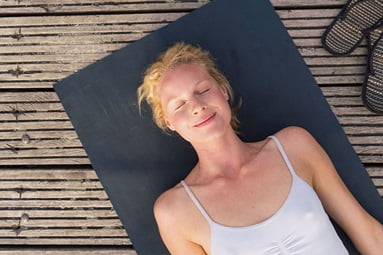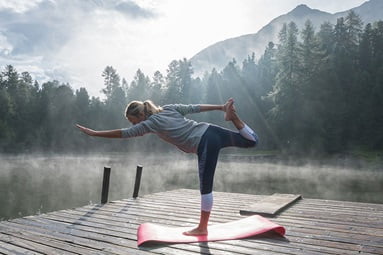
Winter swimming: Exposure to cold water boosts the immune system
Swimming when the temperatures are low is very popular in Switzerland. However, there are some rules you must observe when swimming in the winter. You can find out what they are in the health tip.
Anyone who is out for a winter stroll and comes across people in swimming costumes may be taken aback at first. But this activity, which is regarded as a normal part of life in Nordic countries, is now also becoming more widespread in Switzerland. More and more people are swimming in lakes and rivers in winter.

The strain on the cardiovascular system during winter swimming is significantly higher than during a sauna session. Individuals who suffer from high blood pressure, peripheral arterial occlusive disease (PAOD), cardiac dysrhythmia or any other illness that is aggravated by exposure to low temperatures should avoid swimming in cold water. Individuals with other chronic diseases should consult their doctor.
*Click here for details of the contribution.
11.01.2023
The cold boosts blood circulation
This ice-cold pastime strengthens the immune system. The cold water causes the blood vessels in the skin to contract. More blood is directed to the body's vital organs. The circulation gets going, heart rate and blood pressure rise rapidly, and the body releases adrenaline. However, cold tolerance and positive effects only develop if you are regularly exposed to cold stimuli.
The strain on the cardiovascular system during winter swimming is significantly higher than during a sauna session. Individuals who suffer from high blood pressure, peripheral arterial occlusive disease (PAOD), cardiac dysrhythmia or any other illness that is aggravated by exposure to low temperatures should avoid swimming in cold water. Individuals with other chronic diseases should consult their doctor.
Important tips for winter swimming
You should follow the rules below in order to ensure that winter swimming has really positive effects on your health:- Warm up well before winter swimming.
- Avoid alcohol.
- Enter the water slowly; don't jump in.
- Stay close to the water's edge; don't get out of your depth.
- Always go swimming with at least one other person.
- Keep your head warm by wearing a bathing cap and don't put your head under the water. About one third of body heat is lost through the head. You can also wear neoprene shoes and gloves to protect your hands and feet.
- Warning signals: If you start to feel unwell or have cramps, leave the water immediately.
- After swimming, warm up slowly (dry yourself thoroughly and put on warm clothes).
- Do not have a hot shower immediately after winter swimming.
- Rule of thumb: Never swim for longer in minutes than the water temperature is in degrees Celsius. For example, if the water temperature is 6°C, do not go swimming for more than 6 minutes.
Pools and saunas
Perhaps immersing yourself in cold water isn't your idea of fun. Maybe you prefer your water warm? No problem. Under the COMPLETA FORTE, COMPLETA PRAEVENTA and OPTIMA supplementary insurance plans, SWICA contributes up to CHF 900* towards annual and semi-annual memberships of indoor pools, thermal baths and saunas.*Click here for details of the contribution.
11.01.2023
In the event of further health-related questions, SWICA customers can contact the santé24 telemedicine service free of charge on +41 44 404 86 86. A telemedicine practice licence allows santé24 physicians to provide additional medical services in cases that are suited to a telemedicine approach. SWICA customers can also use the BENECURA medical app to carry out a digital SymptomCheck and receive recommendations about what to do next. During a subsequent phone call with santé24, customers can decide for themselves whether to release their information from SymptomCheck to santé24.







